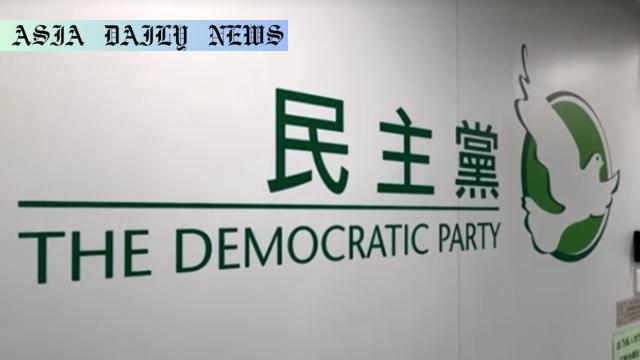Democratic Party: The disbandment of Hong Kong’s largest pro-democracy party signifies escalating pressure under the National Security Law.

Introduction: Democratic Party’s Disbandment Marks a Historic Shift
In a somber turn of events, Hong Kong’s Democratic Party, the largest pro-democracy group in the region, has decided to disband. Founded in 1994, the party was a symbol of hope for democracy under Hong Kong’s “One Country, Two Systems” arrangement after its handover from British rule in 1997. However, relentless pressure under Beijing’s intensifying crackdown on dissent extinguished its flame of advocacy. This development not only ends a 26-year journey but further diminishes the space for political freedom in the territory.
Roots and Ideals of the Democratic Party
The Democratic Party emerged as a beacon for pro-democracy sentiment during the 1990s. Advocating for universal suffrage and transparent governance, the party played a crucial role in mobilizing public opinion and fielding candidates in local elections. Its popularity allowed it to occupy a significant number of seats in the Legislative Council, where it championed civil liberties and sought justice for the ordinary citizens of Hong Kong.
Impact of the National Security Law
In 2020, the introduction of the National Security Law by Beijing marked a turning point for Hong Kong’s political environment. The law criminalized acts deemed subversive, secessionist, or collusion with foreign forces. Pro-democracy parties and individuals bore the brunt of this crackdown. The Democratic Party saw key members prosecuted and imprisoned for actions as routine as hosting a primary election ahead of the Legislative Council vote. The chilling effect of these actions ensured that political dissent became increasingly fraught with danger.
Challenges Faced by Pro-Democracy Entities
The Democratic Party is not the first casualty of this political shift. Over the past three years, numerous pro-democracy groups and civil society organizations have ceased operations under immense pressure. The lack of resources, surveillance from authorities, and restrictions have crippled grassroots activities and stifled dissent. Despite submitting its views on governmental policies and budgets, the Democratic Party faced insurmountable odds to continue its mission.
Why the Disbandment is Significant
The Democratic Party’s decision to dissolve signals more than the loss of a single political entity. It epitomizes a wider trend of eradicating democratic activism in Hong Kong. While government-controlled narratives dominate the public discourse, the absence of influential opposition disempowers citizens seeking representation for their concerns. The consequences are particularly dire for governance, as policy decisions will lack balanced debate and scrutiny.
The Final Steps and Legacy
The official disbandment requires 75% approval from the party’s members in the upcoming general assembly. The decision is almost guaranteed to move forward considering the increasing difficulties faced by its affiliates. Looking back, the Democratic Party’s persistence even under challenging circumstances serves as a testament to its members’ courage and commitment. It remains a symbol for many in Hong Kong of the fight for democratic ideals, even as its disbandment marks another chapter of suppression.
The Global Perspective
Observers worldwide lament the shrinking freedoms in Hong Kong, a region once celebrated for its semi-autonomous governance. The international community, including nations such as the United States and the United Kingdom, has voiced concern over the erosion of rights guaranteed under the Sino-British Joint Declaration. The disbandment of the Democratic Party highlights the urgency of these concerns and reinforces the narrative of Hong Kong’s diminishing democratic space.
Conclusion: The End of an Era
While the Democratic Party may cease to exist, its legacy of steadfast struggle in the face of adversity will remain etched in Hong Kong’s political history. As the city’s pro-democracy voice diminishes, it reminds the global community of the importance of remaining vigilant. In these challenging times, ensuring the protection of democratic ideals and human rights is more crucial than ever.
Commentary
Reflections on the Democratic Party’s Closure
The decision by Hong Kong’s Democratic Party to disband is both a tragic and monumental moment. For over two decades, this group symbolized hope, a resistance against authoritarian control, and a voice for those yearning for greater freedoms. It is disheartening to witness the demise of such an entity, but the pressures they faced under the National Security Law were overwhelming. The global community must take heed of this development as a dire warning about the freedoms being stifled in regions once deemed bastions of democracy.
Implications for Hong Kong’s Future
The absence of organized opposition in Hong Kong has a profound impact on its governance. Without healthy dissent, any system runs the risk of perpetuating policies that lack accountability. The Democratic Party’s closure serves as a stark reminder that the erosion of political pluralism is not just a Hong Kong issue; it is a global concern. The international community, along with human rights organizations, must use this moment as a rallying cry to support those still struggling for their freedoms.
A Lasting Legacy
While the Democratic Party may no longer exist, its legacy will continue in the hearts of many Hong Kong residents who remember its contributions. From grassroots advocacy to holding powerful authorities accountable, the Democratic Party’s work is a reminder of what can be achieved in the face of adversity. It falls upon the next generation to draw inspiration from this legacy and find innovative ways to advocate for democracy and justice, even amidst the increasing challenges.


